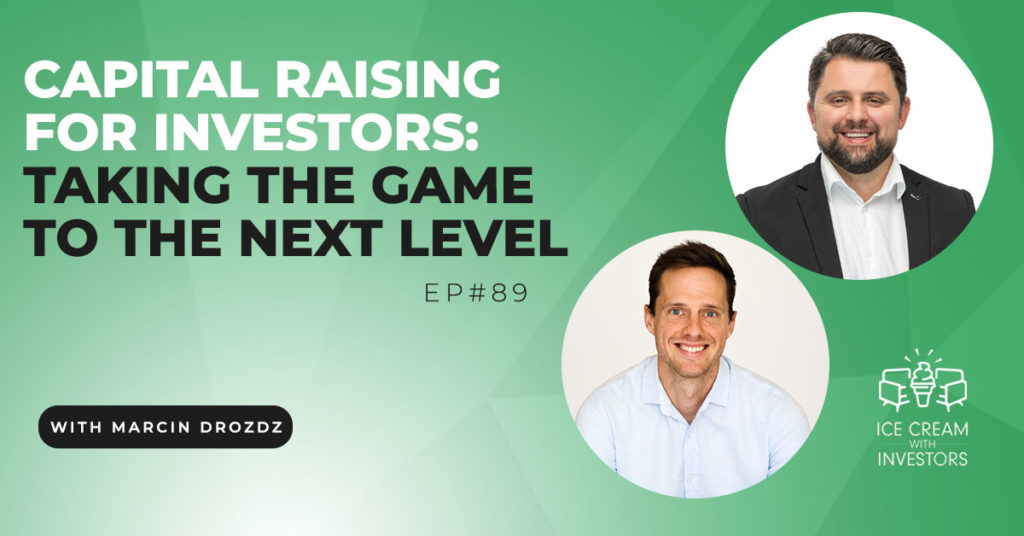Setting a goal is the first step to achieving it, but it’s not the only step. It would be best if you also took consistent daily action to move closer to your goal. That is what our guest, Marcin Drozdz, had to go through. From carrying signs for realtors, he worked his way to now being the Managing Partner of M1 Real Capital. Today, Marcin and his team focus on acquiring value-add multifamily properties throughout the southeast. In this episode, Marcin shares his journey to capital raising, why habits are critical to achieving goals, and how the EASY Formula can help real estate investors level up their capital raising game.
—
Watch the episode here
Listen to the podcast here
Capital Raising For Investors: Taking The Game To The Next Level With Marcin Drozdz
We have on Marcin Drozdz. He is the Managing Partner of M1 Real Capital where he and his team focus on acquiring value add multifamily properties throughout the Southeast. Over the years, he has helped acquire over 1,500 units in the US and has become a go-to in the world of capital raising. I’m on this journey of raising capital, so I’m going to pick his brain on the easy way to raise capital.
—
Marcin, welcome to the show.
Thank you for having me. I appreciate the opportunity.
We like to start with the difficult questions here. What’s your favorite ice cream?
Peanut butter cup.
I’m on a big peanut butter kick, so I can get down with that.
I’m also addicted to the stuff.
You are coming to us from Canada. Is there a good Canadian peanut butter cup ice cream that we should be on the lookout for if we’re ever up that way?
If there is, I’m sure it’s mixed with maple syrup.
Peanut butter and maple syrup can’t go wrong. Tell our listeners what’s the scoop? What do you do?
I appreciate the opportunity to share my story a little bit. I’ve been at this for several years. I started in private equity and the real estate side then started doing my own deals. Fast forward, the thing that you and I were chatting about earlier that gets me excited is in addition to buying apartment buildings and doing what we do, we started M1 training where we teach people the systems and processes behind being able to raise capital.
It blows me away that you have a checklist for tenants and acquisitions, and when you get financing. When it comes to fundraising equity or fundraising deal structuring, most people are like, “I don’t know. Let’s go out and talk to people. Let’s figure it out.” With M1 training, I’ve hit that right on the head. It’s been a fun process to try to take something that, to me, came naturally and make it simplified. That’s the scoop.
It’s unrealistic to expect people to do things a hundred percent the way you want them done.CLICK TO TWEET
I love having you on the show because I’m on this journey. I’m going to use this hour to pick your brain on all the best practices for that. Before we get there, where did your real estate journey begin?
I’m sure you’ve heard this once or twice. I read Rich Dad Poor Dad when I was pretty young. I read the book and thought to myself, “I can do that. I can figure that out.” I went through the process to learn how to buy properties. Nobody in my family owned real estate. My family is from Europe. You don’t own a property in Europe. You rent. Everyone rents. That’s the mentality. Things were so expensive that you didn’t even look at real estate.
When we came over to North America, we rented for a good period of time. I needed to get access to people that were in the real estate business. As a teenager, the only way I could add any value was to carry For Sale signs for realtors. It’s a true story. That’s what I did. I did it for free, and I had to beg them to let me do it. I’m jamming these massive rod iron signs into my beat-up, old Volkswagen Golf. I wanted to be in the room. I wanted an excuse to walk into the office. I then started hearing things like amortization schedules and purchase and sales agreements.
How do you understand a topic? You learn the words and then you go research the word. I did that. After a while, one of the realtors took pity on me and decided to help me out. I figured out how to buy my first property and bought a rental property. The month after, I immediately learned about negative cashflow. I was 20 or 21 years old. I also learned an important lesson that not all realtors are investors. It was interesting because the rent I thought I’d get, I didn’t get. Whatever it was per month, it was negative cashflow. It was an experience. I vacated the property, renovated it, flipped it, and made a ton of money.
At that age, I was like, “I could make more money flipping one house a year than I could be working a job.” From there, I was hooked. Fast forward a couple of years, I was lucky enough to get recruited into a private equity business with a real estate focus. I immediately went from the small single duplex and small multifamily into, “We’re buying this 200-unit building. We’re buying this 300-unit purpose-built rental. We’re doing this conversion.” In my early twenties, I saw that, and that was it. I was hooked.
Do you remember who gave you the book, Rich Dad Poor Dad, or where you stumbled upon it?
I bought it myself when I was walking through Coles, Barnes & Noble, or whatever it was at the time. I was walking by and I saw the subtitle. It caught my attention. It said, “What the rich teach their kids about money that the poor and middle class don’t.” I read that like a slight. I was like, “Let’s see.” I opened and read half of the book in the store. I bought it, went home, and read the rest of it that night. I went back the next day and read Rich Dad’s CASHFLOW Quadrant. I went back the next day and read Rich Dad’s Guide to Investing. I was through 3 or 4 of his books within a month.
I have a purpose for asking this question. Were you a big reader before that?
No.
I tend to think that I was a terrible student growing up. It was because I wasn’t generally interested in the topics. When I first found reading and topics that I enjoyed, then I could devour books. If it’s stuff that I don’t enjoy or is way over my head, like Science, for example, then I’m not a huge reader. I find it interesting when people first find that book. Either it clicks or it doesn’t. For the ones that do, you can’t ever look back.
I never thought about it like that, but you’re right because since then, I’ve devoured books. I listen to a lot of audiobooks as well because it’s easier sometimes. I always associated reading with a textbook. For me, reading was another Science book. As soon as I read something that I could see myself implementing, it was a game-changer.
Some people read the book and they’re like, “I don’t know what to do next. It doesn’t tell me what to do.” Books don’t tell you what to do. They give you a why and a what, but they don’t give you a how. They’re not how-to books. People that are generally good at school are always very critical of that book because it doesn’t tell them, “Here is exactly what you do. You then do this and you then do that.”

Raising Capital: Many people have that Lone Wolf mentality where you have to do it yourself if you want it done. You can’t expect other people to perform at the same level, but it will never get beyond you if that’s your mentality.
It’s a huge mindset shift. I gave it to my nephew who graduated high school not too long ago. He’s not a huge reader. I got my fingers crossed that he reads it to see if this changes the way he views the world. One thing I loved about that book specifically was it talked about, don’t think about the obstacles to getting something. Think about, “How can I get it?” I forgot the exact terminology. You’re up there. You’re flipping houses and then you get recruited into this PE firm. Did you know that you wanted to go into real estate full-time? Did you know you wanted to get into private equity? Talk to us a little bit about how that went down.
I saw the real estate thing as a real, tangible way to be able to create financial freedom. To me, it made so much sense. I could wrap my head around it. The tangibility of what it was wasn’t fluffy. It wasn’t a pie in the sky. It was there. For me, even at a young age, it made all the sense in the world. As far as the private equity thing, I saw that as a shortcut to getting in a room.
Anytime I want to learn something, I either find a mentor, get training, or align myself with a group of people that are already operating at that level. I learn best by getting thrown on the front lines. To me, that is my favorite way to learn anything. Do you want to learn a sport? Let’s go play. Do you want to learn how to play chess? Let’s go play a few games.
Do you want to learn business, real estate, or fundraising? Throw me in it. We’ll figure it out. I’ll read the textbook maybe after, but I want to go try it first. For me, the PE thing made tons of sense. I didn’t know anybody else buying 200 or 300-unit buildings. We were doing the things you read about in the paper. From a mindset perspective, after that, anything’s possible.
I also talk a lot about when people are looking for their careers or next moves in their careers. People make career decisions based on family, finances, or skills. Early on in your career, you should always go to the skills and the people that are the leaders in that organization. Those skills will compound and pay dividends over time as we’ve seen in your career as you’ve worked your way through PE and run a PE firm of your own.
It’s a full circle.
Let’s talk about some of the skills you learned at the private equity company. Were you raising capital? Were you doing deal underwriting? What were you doing in that world?
My primary goal was deal capital raising. That was my primary objective in the business. What made it interesting was that over a fairly quick period of time, I had good success in grinding it out. When they tell you to do certain things, most people say they’ll do them. I just did it. I didn’t know any better. I did the things they told me to do. If they told me to do X, I do X times 5 or X times 10. Because of that, the amount of equity that I was able to bring in from the qualified investors that we were pursuing was 2x, 3x, and sometimes 5x than what other guys were doing.
I had an opportunity to ask a lot more detailed questions that may be a kid in their early or mid-twenties shouldn’t have the right to ask. If you’re bringing in half the cash for a deal or 1/3 of the cash for a deal, then they’ll entertain it. They’ll discuss it with you as somebody who has added value. I had an opportunity to learn from the operators. I got to ask the questions.
Towards the latter part of my time with that firm, I did get involved with the structuring side. Whether they liked what I said or not, I was in a position to have an opinion. I started having opinions because I had started connecting the dots whereas other guys were just happy to make $200,000 a year or whatever it was. I was very interested in the business of how things came together.
I went out of my way to build relationships with the service providers, infrastructure, and ecosystem. After a few years of doing that, I realized very quickly that unfortunately, I’d hit the ceiling in that entity and that business. Their goal was for me to be a high-paid successful employee forever. That wasn’t what I signed up for, so I made a very unpopular decision to move on and start on my own.
The biggest challenge many people have, whether they’re syndicating or doing funds, or even just trying to get their first investor, is overcomplicating the conversation. They talk in a context that people don’t understand.CLICK TO TWEET
When you go into business for yourself, drop that W-2, and pick up your own thing, all of a sudden, you’re responsible for everything from the business cards to hiring to everything down the line. You realize that that skill that you were fantastic at is just one piece of a much larger wheel. In my mid-twenties, the grays came at that point. I was like, “What’s the matter? I’m great at this.” That’s fantastic and important, but it has to fit into something bigger.
It takes a team to do everything in a business.
Learning team building was a very sobering experience for me. A lot of people will relate to this, whether you’re in real estate, tech, or whatever it is. Typically, a lot of people have that lone wolf mentality where if you want it done right, you got to do it yourself if you can’t expect other people to perform at the same level. It will never get beyond you if that’s the mentality you have.
How did you make that transition? It’s almost like you have to because the boat’s going down. You need extra people to help it grow. I see this a lot in sales professionals specifically. Usually, sales professionals are A-type personalities. They are very hard-driven. They like things done a specific way, but when it comes to leading a broader group, they sometimes struggle with that. Talk to us a little bit about some of the learning lessons you learned along the way.
One of the things I keep in mind is to aim for progress, not perfection. That’s probably one of my favorite quotes as well. First of all, let’s assume that the way you do it is the right way to do it which is also highly debatable as I’ve learned over the years. Let’s assume the way you do it is 100% the right way. Wouldn’t it make sense to have 3, 5, 10, or 20 other people doing things that you are capable of doing the best? Wouldn’t it make sense to have those people do it 80% the same way? Wouldn’t you get much further? Wouldn’t you have much better results?
That’s the way I look at it because within my team, organization, and businesses, whatever we do, it’s unrealistic to expect that people are going to do things 100% the way I want them done. To be candid, when someone else is doing that thing full-time, they will come back with better ideas or a better mouse trap. The 80% that I thought they’re operating at might end up being 120%, 130%, or 200%. It is having the humility to create an environment where people can call you out on things, and have the confidence to know that they’re not going to be penalized for trying to improve things and raise the bar.
A lot of A-type people, especially salespeople, have a tough time with that because they’re used to being the alpha. They’re used to being the person that is out front. They’re like, “I got the S on my chest. I got the cape. It’s me. I’m the reason why this all works.” There’s a book called Good to Great. It talks about the best form of leadership is the leader who when things go well, points at the team and when things go bad, points at themselves. A lot of people live their lives the other way around. When things go bad, they point at everybody else. When things go well, they’re like, “That’s why I’m here. That’s why this worked.”
One thing I don’t want to breeze over is this concept of progress, not perfection. I have a saying, “Get going and then get good.” Many people want the in-state of whatever they’re trying to achieve. Until they can get to the in-state, they’re not willing to take the first step. We think about this with finances, making our first deal, or making sure you have all the pieces of information before you invest in something over and over again. It’s about progress and moving little inches down the field versus trying to throw a Hail Mary and get to the end zone as quickly as possible.
You can’t compare your day 1 to someone else’s year 10. That’s silly, yet that’s what a lot of us do. A simple analogy is working out. There was a time I was training for a Half Ironman here up in Canada. I’m a plus-size model. The monitor makes me look a little thin but I like my ice cream. I had to get in a certain shape to run, and I hated running. How did I do it? On the first day, I put my shoes on the door. On the second day, I put them on and I walked down the block. On the third day, I went around the other block. By 1 week, 2 weeks, and 3 weeks, I was running 1 mile, 2 miles, and 3 miles. It wasn’t because from day one I said to myself, “I’m going to go run 21 miles.” No way.
You must have done some research because I am an Ironman athlete and I completely agree with that. I talk a lot about when people hear of an Ironman race, which is 140.6 miles, or a half, which is 70.3 miles, they think there’s no way I could do that in a day. I’m like, “It’s the little consistent actions of doing something every day that gets you towards that goal.” There’s no one workout that’s going to get you ready for that. There are no 2 workouts if you miss 1 workout that is going to make up for the missed workout. It’s about doing something every day and not necessarily the right thing every day.
I had to get a goal that was so outrageous. I signed up for the Ironman a year before and I was like, “I’m going to get back into shape.” I needed an end result to be accountable because I’m not going to show up at this thing and be disqualified. I was like, “I’m going to finish this thing.” I had to shave off 20 or 30 pounds. I had to change some habits. It was good for me, and that’s why I did it. We had a baby a little while ago, so I’m an iron kettle now. I’d like to be an Ironman again at some point. Maybe we can get that back on the roster. It’s progress. If I have to think to myself, “Am I going to do it again?” No. I got to put the shoes at the door, then this, and then that.
I want to change gears now and talk a little bit about capital raising. I want to pick your brain on the easy way to raise capital. You’ve come up with a system or a formula for raising capital. Can you walk us through the EASY System that you put together?

Raising Capital: People are looking for the authentic version of you. They don’t write checks because of the deals; they write checks because of the people.
I’d love to. The EASY System is an acronym. E is Exclusive, A is Abundant, S is Scarce, and Y is Your Allocation. The EASY System is a much broader process than what I’m about to talk about. The actual acronym itself is something that people can use if they’re re-engaging old contacts, feeling some urgency on a transaction they need to find some capital for, or at least trying to establish some value with a potential investor.
The biggest challenge that a lot of people have, whether they’re syndicating or doing funds, or even trying to get their first investor, is they over-complicate the conversation. They talk in contexts that people don’t understand. For example, I have friends that are very successful business owners and entrepreneurs. They sold companies and bought companies. If I started talking about going in cap rates and coming out cap rates, what’s happening with the rates, how it’s going to compare to fixed or variable mortgage, and some of the technical stuff that we amongst ourselves love to talk about, then they’re going to stare at me. Eventually, the glaze will form and that will be it.
A confused mind doesn’t buy. A confused mind doesn’t engage. Don’t talk to me in those terms. Tell me about things that I can understand. There are only 3 or 4 things that are good about your deal that make it exclusive. Simple things like, “It’s on the corner of Main & Main and there are 20,000 cars a day.” I understand that. If you’re like, “It is across the street from the VA or the hospital, or there’s a FedEx shipping office right there.” These are things that anybody can understand.
Tell me that the appraisal came in and it is $1 million over what you guys tied up the property for. I get that. I understand. Tell me that. It’s unique because it’s all two bedrooms and it’s great because of the community. Tell me things that I, as an everyday person, could go, “I may not know the price per square foot. I don’t understand cap rates, but I understand what you said because I drive by that building. I get it. It makes sense.” These things are so exclusive.
Think about 3 to 5 things that make your deal. What are the things that you fell in love with? You didn’t fall in love with the going-in cap rate and going-out cap rate. You fell in love with the basic things in that building or asset that make it make sense practically. The rents are $300 a month under market. That’s great. That’s simple to understand. That’s E, the Exclusive.
The A is the Abundant piece. A lot of people that go out to raise money almost approach it from a perspective of almost hat-in-hand. You’re like, “What do you think of this deal? I’d love your opinion.” You’re almost looking for validation from them on what you’re doing. You’re a professional. You know what you’re doing. You know your business. You have an abundance of people to talk to. You have to make that very clear to people in a way where you don’t sound arrogant, but you’re being candid.
The Abundance piece can be as simple as, “We didn’t get a chance to work on the last deal. I immediately thought of you on this one. I’m going to go ahead and walk you through this. I do need to let you know that I’m only looking for X amount of investors. I still got another sixteen people to talk to.” There’s a polite way to let them know that you’re doing this. You’re like, “This is happening. I am moving forward. I would like you to be part of it,” as opposed to a hat-in-hand approach where you’re like, “I’d like your opinion on this. What do you think?” You can do this in a way where it’s not arrogant. It’s a function that you’re doing this. The Abundance piece is important.
S is for Scarcity. In real estate, there are two forms of scarcity. One is time, your closing. When are you closing? That is a form of scarcity. One of the mistakes people make is they give the investor the actual real estate date closing. If you’re closing the property on the 31st, the investor might think, “I can send a check on the 30th?’ You can’t, so give yourself enough time. Smart syndicators know the difference. They typically say fund closing is on the 10th, 15th, or whatever it is. That’s one form of scarcity.
The other one that’s obvious is the amount of room you have. You’re raising $1 million, $5 million, or X million dollars. Whatever that amount is, make that clear. It could be as simple as, “We’ve gone through the abundance piece. I got a few people I need to talk to, X, Y, and Z. My challenge with this opportunity is we’re closing on the 10th of the month. Our financial closing is on the 10th of the month. We’re only looking for $1 million and our average investment is typically between $100,000 and $150,000. We’re looking for another 7 or 8 people to participate”
There you go. There’s your Scarcity. You’re not pushy or salesy. Never lie. Never BS. Never fudge. If you got 3 people to talk to, tell them you got 3 people. If you haven’t raised any money yet, tell them the bigger checks you get, the smarter people you’ll come across. Be honest. Be candid. Always tell the truth wherever you’re at and they’ll appreciate that.
The last part is Your allocation. In other words, we’ve gone through Exclusivity. What makes the deal make sense? “There’s a lot of people I could talk to. I thought of you. Here are my limitations in terms of scarcity.” You’ll have a back and forth. Maybe they’ll ask you about the market, “What about this? What about that?” It’ll be a conversation.
Capital raising is a highly regulated activity. Whatever you’re doing, get the proper paperwork.CLICK TO TWEET
At some point, you might say something like, “It sounds like this is interesting. This might be of interest to you. You need more information. I’m going to send you the package, but if everything did check out, what allocation would you potentially consider?” They might say, “I’m not interested.” If they’re interested, they will tell you, “If everything checks out, I would consider doing X or Y.” You can say, “That’s great. Today is Tuesday. I’m going to send you the package after so you can review it. Do you mind if we hop on a call on Friday to see if it all makes sense? At that point, we can decide where you’re at.”
This is a good formula for sales in general. Most of our audience knows that I’m in sales, so I appreciate the art of the sale and the art of presenting something of this EASY formula. Where do you feel like people miss the most? What’s the hardest thing for somebody to grasp and implement?
They never ask for the commitment. With everything I’m saying, please check with the securities, lawyer, and accountant. Have all your paperwork done. Make sure you’re dealing with the right investors. Capital raising is a regulated activity. This isn’t like selling. This is a highly regulated industry. You’ve got the SEC. You’ve got the regulators. Follow the rules of 506(b), 506(c), or whatever you’re doing. Get the right paperwork.
Ahead of that, the biggest challenge that I see is people don’t ask for the sale. They don’t ask for the commitment or they don’t clarify with the individual, whether this is a fit for them or not. They don’t do it. They typically end a phone call. You’re like, “I’ll send you the information.” They’re like, “Let me know,” and hang up. They want to get off the phone because you boxed yourself in. You didn’t ask questions or demonstrate value. You haven’t created urgency and explained the circumstances surrounding this transaction properly. That is a skill set.
One thing I’ve learned about sales more than anything is you only get what you ask for in life. I’m not saying that you will get everything that you ask for, but you only get what you ask for. You might as well ask for things that you want because you would be surprised by what comes back to you.
One of the things we teach with our group is this. If you feel like you’re losing someone’s attention or they’re not responding to you, calling you back, or emailing you back, one of my favorite questions to ask which is super polite but also gets right to the heart of matters is, “I haven’t heard from you. Is this still a priority for you?”
What I do isn’t a fit for everyone, but you can be like, “We had a good conversation. I haven’t heard back. Is this still a priority?” If they say, “It is, but my goldfish died,” or, “Something happened.” Whatever it is, maybe they needed that jolt, or maybe they had a change of heart. Maybe something came up. Maybe they need the money for something. It’s life. As long as people always feel like it is okay to say no, that you’re a professional, and your train is moving regardless, you’re welcome to come back. Circumstances change.
The Abundance piece of, “This train is moving with or without you. We would love for you to be on,” is the hardest shift for me to overcome, but I also love Exclusive in the way you describe Exclusive. You and I are big into this space, so we can talk all day long about vocabulary and acronyms. For the people that aren’t in this space, they don’t understand that.
One of my favorite quotes in life is to meet people where they are before trying to bring them to where you want them to be. That’s a perfect point where you have to sometimes educate your investors on what the qualifications of a good deal are and why this is a good deal. It’s a super easy formula for anybody to implement when they’re trying to sell anything.
We make it sound easy, but it reminds me of when I watch golf. I’m like, “I can do that,” so I go by a putter and I can’t put the ball in the hole to save my life. These things that we talk about aren’t complicated. They’re simple, but they’re not easy. It requires repetition. You absorb the content and understand it in a way. The easiest system is a formula for sales as a whole. It’s true because you can apply any deal in any transaction into this format and still build rapport, create urgency, and do it in a way where you’re professional and well-received.
In your program, you talk about the EASY formula. If somebody enrolls in the program, what else would they get from your training?

Raising Capital: Real estate is still the right asset class. People are always going to get a place to live in.
We cover a fair bit. The starting point for a lot of people is helping them package themselves in a way where potential investors can see themselves working with you because they see the traits in you that investors are all inherently looking for. A lot of us are bad at selling ourselves because we think that what we’re doing is not unique. We don’t see ourselves as having anything. There are some people that have a very strong sense of self-worth. A lot of people that get into deals and syndications, especially if they’re starting or growing, have this impostor syndrome and this fear of not being able to have the credibility or the track record.
One of the things we do is we have a niche assessment that people go through. There are several components to it. One of them is your story. In other words, it is being able to tell a story succinctly about yourself, what you stand for, what you’ve done, and where you’ve been in a way where people can pick up certain character traits of you that would lend themselves to, “This person’s trustworthy. They’re reliable. They’re going to see things through. They’re dependable.”
There are certain characteristics that people are looking for from people for whom they’re going to park their money. If someone gives you $10,000 or $100,000, or $1 million, they don’t leave with an apartment building, a car, or a house. They don’t leave with anything other than a piece of paper and your phone number. They’re investing in you. For them to write that check, they have to see things in you that make you trustworthy, likable, credible, and respectable.
One of the things that we do is teach people how to add a package themselves. There’s no gimmickry or tricks. It’s your life framed in a way that puts forward the positive attributes of who you are, which is important. That’s a big part of what we do. That’s something that’s important for people. Your story is one part of it.
The other piece is your unfair advantage. In other words, what is something about you that makes you uniquely qualified to be in that seat? For example, I went into PE. I had access to information at a young age from a different perspective, so that immediately rewired me. I had never been able to go back to flipping a duplex. It’s not that there is anything wrong with that. It’s just I can’t go back to that. My unfair advantage is that I see the capital world from a very different perspective.
For someone else, it could be, “I grew up in a family of realtors. I’m good at finding private deals. I grew up in a family of contractors. I’m good at running trades.” It could be, “My wife and I are engineers. We’re systems-oriented, and that’s why we’re great for real estate.” There are a lot of different components that make you credible, and it’s about putting those things forward.
I love this idea of a unique advantage because as I started growing down this personal development train and finance, I stumbled upon Gary Vee who says that the internet is a huge, vast place where people are carving out their own little niches. If you love talking about purple Smurfs all day, every day, there are at least 100,000 people that would pay you to talk about purple Smurfs all day, every day. What I mean by that is knowing who you are and the people that you generally speak to and connect with is okay to define.
I don’t know how I found this, but do you know how many tractor videos there are on YouTube? There are tractor videos with 80,000 views, 100,000 views, or 1 million views. It baffled me that that’s not anything I know about, but there are people out there that love to learn about the latest tractors out there. Packaging up your unique advantage because there’s an audience for that is one of my biggest learning lessons over the past few years.
It is being able to own that uniqueness to yourself and not shy away from it. With the advent of social media and everything else, people are looking for the authentic version of you. People don’t write checks because of the deals. They write checks because of the people. Deals are out there. If you’re looking to invest in real estate, you can go buy REITs. You can go buy stocks. You can do all kinds of stuff. You don’t necessarily have to buy into a private opportunity. A lot of times, the people that do it, do it because they like the people that are there.
Before we get to the last round here, you’re a guy that’s been in real estate for a long time. You’ve seen it from the PE side to running your own boutique firm. You’ve got 1,500 doors. We’re sitting here in June of 2022. Where do you think are we in the real estate market? Give us some predictions on how you think the next year to five years are going to look because those are two distinctly different time periods.
This is a different world than we’ve been in historically. The last crash that happened in 2008 and 2009 was a crash to too much debt. Now, we potentially have a tsunami of too much money. That is a fundamentally different dynamic. It is possible for the market to crash in real terms, but appreciate in nominal terms. There are a few people in my world that are in consensus on some of this stuff because there’s so much money out there and the saving rates are so high. It is possible for the amount of money that’s out there to chase the limited amount of goods. It makes everything more expensive on paper. At the same time, it’s very possible that the actual tangibility that the amount of capital that you have relative to what things cost even though you have more money can increase in price faster than the amount of more money you have.
There’s a specific characteristic that people are looking for from people with whom they’re going to park their money.CLICK TO TWEET
You have a situation where people are richer on paper, but in practice, they’re poorer. Unfortunately, I see that probably being a theme going forward. How that relates to real estate is rates are going to keep going up a little bit here. They did come up in Canada for another half-point. I’m sure they’re going to keep rising in the US. The trillion-dollar question is, when rates keep going up, A) What straw is going to break the camel’s back? B) When that happens, is the government going to make the unpopular decision to raise those rates, or are they going to make the short-term, more convenient decision of dropping rates again and pumping stimulants?
If they keep raising rates from an Austrian economic standpoint, that’s technically the right thing to do because you tighten the money supply. It is more honest money, but it will create a lot of pain. Governments are historically more prone to print money. I could be wrong as easily as I might be somewhat right. My prediction is that rates will rise continuously, but there will be some events where rates will be tested and they’ll come back down to zero or near zero. When that happens, we’re going to see what we’ve never seen.
The moral of the story is that real estate is still the right asset class. People are always going to need a place to live. People are pitching me about the crypto and the metaverse stuff. I’m like, “I might throw some money at it, but I don’t understand it. I’m trying to understand it. Here’s one thing I do understand. When you take those goggles off and you come back to earth, you’re going to put those goggles down on one of my apartments and go to bed.” That world may coexist as well, but at the end of the day, you’re still going to come back to this planet.
You’re right about a lot of those things around the convenience of printing money versus raising rates and honest money. One of the things that heightened my awareness was in 2020, we started having margin call loans. What that means is that we’ve securitized everything in our economic world to where if it goes down, then somebody is on the hook for paying back the loan quickly and not having that capital to pay back the loan forces a fire sale, which gets you in a deflationary environment.
To your point, people are always going to need real estate. That’s why I believe that no matter what happens, real estate will go up to the right as long as you give it enough time. The problem is, I can’t tell you how much time you have to give it. It might be 5 years or 25 years, but it will be an interesting world that we live in over the next three years.
People ask me all the time, “Is this a good deal?” I always say, “I don’t know. Does it cashflow? Does it make money? Does it carry itself? What is a good deal?” It depends on who you ask. For me, it’s a deal that cashflows regardless of where the market goes. Cashflow is what will get you through a recession or a depression. If the market goes crazy up to the right, that’s great. If the market is stagflationary, that’s great. As long as you’re cashflowing and your costs are relatively fixed, you can weather a lot of storms. Most of the challenges that people have in real estate or business are because they can’t hold on. They can’t carry it.
This was a fantastic conversation. We’re going to switch to our last round here. We’re calling this the Five Toppings. Our first one is, what is your favorite book, or what is a book that you’ve read that’s given you a paradigm shift?
I would have to say that my favorite book remains a book by a guy named Ryan Holiday. It’s called The Obstacle is the Way. The subtitle is, “What stands in the way becomes the way.” I read it years ago. I still give it to our staff. The book drills down on the victim versus the victim mentality and the ability to move forward. In our society, a lot of people tend to have all the excuses in the world not to do something. There’s no shortage of people that will justify whatever inaction you take or don’t take, and that’s fine. Having the ability to move forward is important. The subtitle, “What stands in the way becomes the way,” is a fantastic pretext for the book.
Ryan Holiday is a new name for some of our readers. Go check out his stuff because stoicism and the belief that the obstacle is the way produces a lot of content on that, and it’s fantastic. Our second one is that the person you become 10 years from now is directly correlated to the habits that you have and the things that you do every day. What are some of the things that you do every day?
Cold showers. I can’t tell you how much I hate the cold shower, but it feels great. It wakes you up. It’s the first battle of the day. There are a lot of benefits to it. It’s anti-inflammatory. You can read up about this stuff for days or a week if you want to. Whether you think it’s real or not, I can tell you that for me, it makes a massive difference. It also creates discipline. The other thing I do is I get up at 5:00 AM. I love getting up at 5:00 AM. I get some work done. I get a workout in. My wife gets up and I take the baby for a walk a little bit after. I already feel like I’ve got 1/3 of my day done, and for me, that immediately is empowering.
I love that you said it creates discipline because I’m all about, “You should create these little points of friction in your life to make you mentally stronger.” While I’m not on the cold shower train yet, it is something that would create a ton of discipline for me.

Raising Capital: As long as your cash flows and costs are relatively fixed, you can weather many storms.
You can start like the sneakers at the front door. You can start with a warm shower, then mild, chilled, cold, and then frigid. I didn’t start jumping in with the cold shower however many years ago. I got introduced to it by a buddy of mine that plays football. He was like, “You do the cold plunge thing.” I’m like, “You’re nuts.” I jumped in there with him for twenty seconds. I lost my mind. He was in there for five minutes. I think he’s nuts, but years later, I’m like, “I can see that.”
Our third one is, what’s the best piece of advice you’ve ever received?
My favorite advice that I got was to aim for progress instead of perfection. Another piece of advice that I would give people that I took well eventually was in my early twenties, I had people tell me to enjoy the ride and enjoy the process. Type A people are self-motivated. We’re driven. We don’t need rah-rah tapes to get going. We’re good. If anything, we need de-motivation because we’re already tearing at the seams. We’re ready to go.
The best advice I wish I took earlier is to enjoy the process that you’re going through because it’s going to be a ride. It’s going to be a hot mess. It’s not going to turn out the way you thought, but it’s a process that you can appreciate if you take the time to acknowledge what’s happening as it is happening, whether it is good or bad. At this point in my life, I look at my life as my own little movie character. I’m living my life as a movie in my own mind and I’m trying to be the good guy in the movie.
Some of the most impactful vacations I have are where I don’t have cell service. I can truly decompress. Enjoy the ride and you’ll be surprised how much mental clarity you have from that. Our fourth one is, what’s the thing that you’re most proud of in your life?
I’m a new dad, so I would have to say, my daughter. I’m one of those dads before who doesn’t have kids that were like, “Not again.” As soon as you have that kid and your baby grabs your finger with their whole hand, it’s the proudest. I want to continue to be the person that when she’s older, whether she sees this episode or anything else I’ve done, I want her to be like, “That’s my dad.”
Our last one is if you could sit down and eat a bowl of ice cream with anyone dead or alive, who would it be and why?
If it was alive, given where we are in the world with the crossroads, I’d have to say Ray Dalio because he is well ahead of his time with the books he has written. He wrote a new one.
The Principles for Dealing with the Changing World Order is his newest one.
It’s a dense book. I read it twice and am going on three times. That thing reads like a textbook, but it’s so good. I would be curious to hear candid, unscripted answers when I ask, “What did you mean by this?” He’d be an interesting guy to talk to.
To anybody that is reading, you should have Principles in your life. Before he wrote that, he was a underrated, unknown figure, billionaire. He had a $17 billion, $18 billion, or $20 billion net worth. Not many people knew about him before he came out with some of his teachings and learnings. I agree with you that the stuff he puts out is very dense. He does a good job of simplifying it. If you capture it, it’s mind-changing. If you’re not a reader, his videos on YouTube are as good. The animated ones he puts together are as good and simple.
He talks about the debt cycle and credit cycles. He ties historic events together from various different times. I can’t say enough good stuff about him and his books.
This was a fantastic conversation. We appreciate having you on. If our readers wanted to reach out to you, learn more about you, or get connected, where’s the best place that we can point them?
The best way to get connected is my website, MarcinDrozdz.com. There are free tools and resources there for people that are looking to figure out how to scale capital raising and team building. There is a lot there for people. We sometimes do quarterly challenges or five-day challenges. We’ve got all kinds of different things to help people step up and scale their real estate.
It was fantastic having you on this episode. I appreciate it.
Thank you for having me.
Important Links
- M1 Real Capital
- Rich Dad Poor Dad
- Rich Dad’s CASHFLOW Quadrant
- Rich Dad’s Guide to Investing
- Good to Great
- The Obstacle is the Way
- Principles for Dealing with the Changing World Order
- Principles
- MarcinDrozdz.com
- https://www.Linkedin.com/in/MarcinDrozdz/
- https://www.Instagram.com/RealMarcinDrozdz/
About Marcin Drozdz

Marcin started investing in real estate in 2006 and has since sourced nine figures in private capital that has helped acquire over 1,500 units across the US. On the tail end of the 2008 crash, Marcin and his team raised an 8-figure fund and invested in commercial properties in Arizona.
Today, Marcin is the Managing Partner of M1 Real Capital where he and his team focus on acquiring value-add multifamily properties throughout the southeast.
When he’s not on the lookout for opportunities, Marcin is teaching up and coming real estate investors how to raise capital & scale their real estate business.





